CROSS CULTURE MANAGEMENT
VerifiedAdded on 2023/01/09
|11
|3144
|4
AI Summary
VERY IMPORTANT
Contribute Materials
Your contribution can guide someone’s learning journey. Share your
documents today.

Cross cultural
management
management
Secure Best Marks with AI Grader
Need help grading? Try our AI Grader for instant feedback on your assignments.
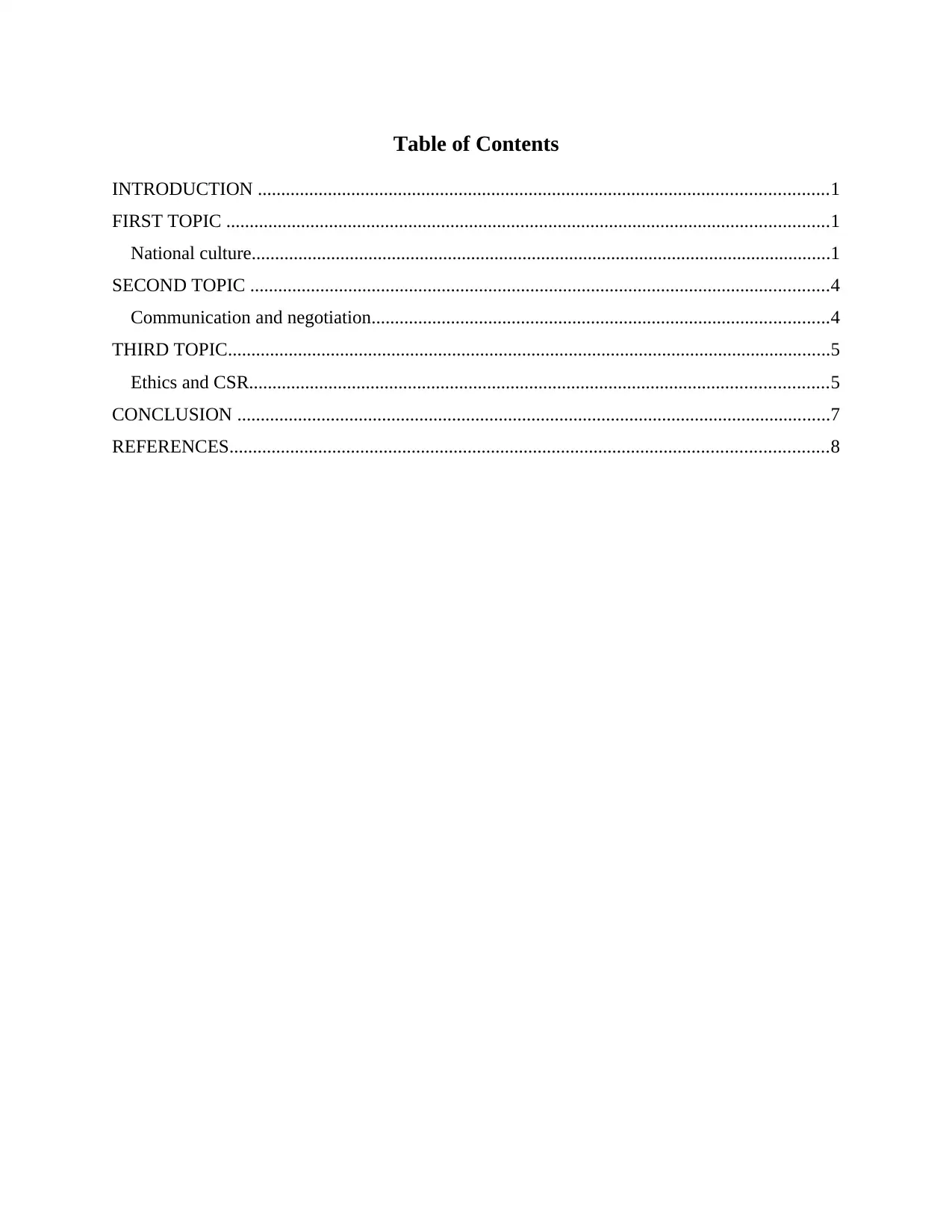
Table of Contents
INTRODUCTION ..........................................................................................................................1
FIRST TOPIC .................................................................................................................................1
National culture............................................................................................................................1
SECOND TOPIC ............................................................................................................................4
Communication and negotiation..................................................................................................4
THIRD TOPIC.................................................................................................................................5
Ethics and CSR............................................................................................................................5
CONCLUSION ...............................................................................................................................7
REFERENCES................................................................................................................................8
INTRODUCTION ..........................................................................................................................1
FIRST TOPIC .................................................................................................................................1
National culture............................................................................................................................1
SECOND TOPIC ............................................................................................................................4
Communication and negotiation..................................................................................................4
THIRD TOPIC.................................................................................................................................5
Ethics and CSR............................................................................................................................5
CONCLUSION ...............................................................................................................................7
REFERENCES................................................................................................................................8

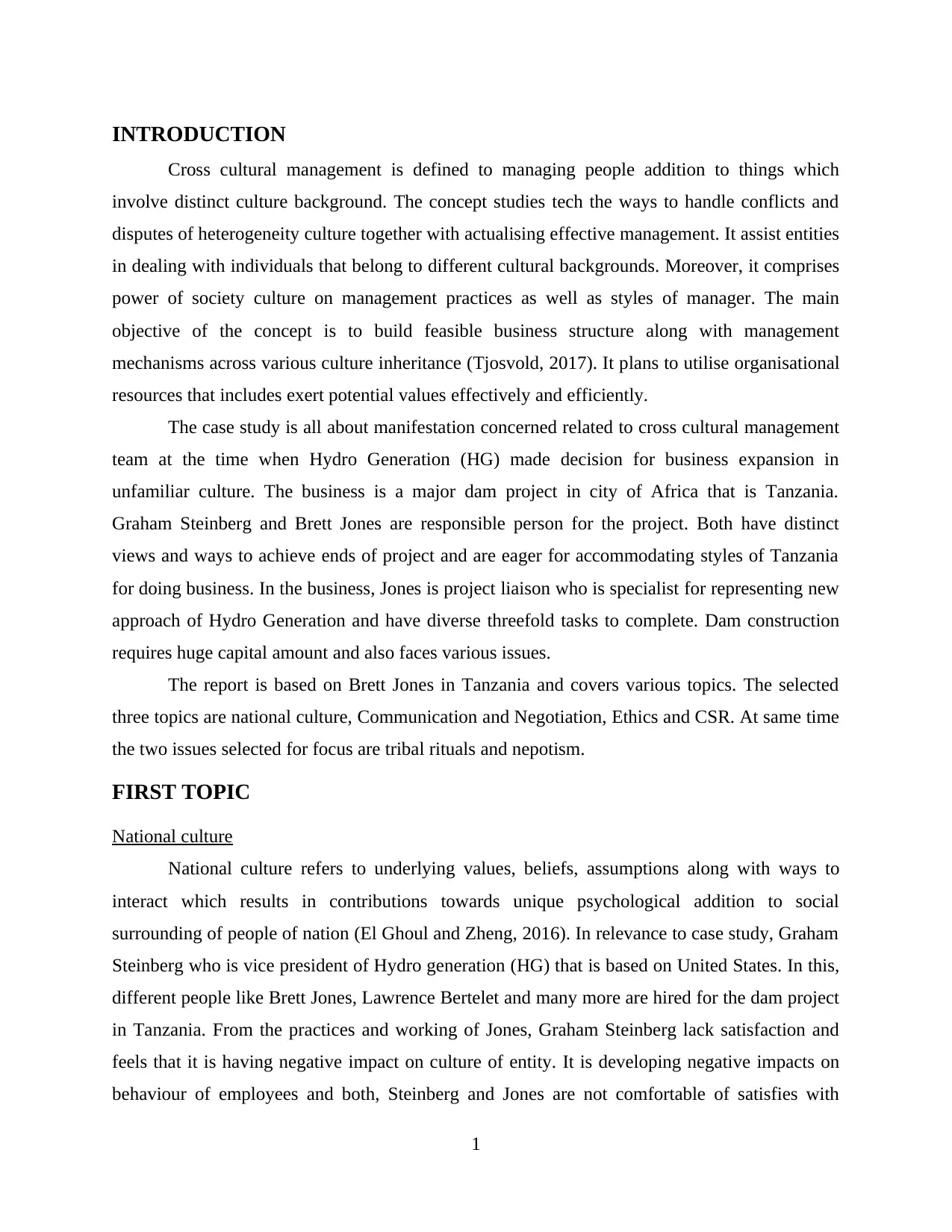
INTRODUCTION
Cross cultural management is defined to managing people addition to things which
involve distinct culture background. The concept studies tech the ways to handle conflicts and
disputes of heterogeneity culture together with actualising effective management. It assist entities
in dealing with individuals that belong to different cultural backgrounds. Moreover, it comprises
power of society culture on management practices as well as styles of manager. The main
objective of the concept is to build feasible business structure along with management
mechanisms across various culture inheritance (Tjosvold, 2017). It plans to utilise organisational
resources that includes exert potential values effectively and efficiently.
The case study is all about manifestation concerned related to cross cultural management
team at the time when Hydro Generation (HG) made decision for business expansion in
unfamiliar culture. The business is a major dam project in city of Africa that is Tanzania.
Graham Steinberg and Brett Jones are responsible person for the project. Both have distinct
views and ways to achieve ends of project and are eager for accommodating styles of Tanzania
for doing business. In the business, Jones is project liaison who is specialist for representing new
approach of Hydro Generation and have diverse threefold tasks to complete. Dam construction
requires huge capital amount and also faces various issues.
The report is based on Brett Jones in Tanzania and covers various topics. The selected
three topics are national culture, Communication and Negotiation, Ethics and CSR. At same time
the two issues selected for focus are tribal rituals and nepotism.
FIRST TOPIC
National culture
National culture refers to underlying values, beliefs, assumptions along with ways to
interact which results in contributions towards unique psychological addition to social
surrounding of people of nation (El Ghoul and Zheng, 2016). In relevance to case study, Graham
Steinberg who is vice president of Hydro generation (HG) that is based on United States. In this,
different people like Brett Jones, Lawrence Bertelet and many more are hired for the dam project
in Tanzania. From the practices and working of Jones, Graham Steinberg lack satisfaction and
feels that it is having negative impact on culture of entity. It is developing negative impacts on
behaviour of employees and both, Steinberg and Jones are not comfortable of satisfies with
1
Cross cultural management is defined to managing people addition to things which
involve distinct culture background. The concept studies tech the ways to handle conflicts and
disputes of heterogeneity culture together with actualising effective management. It assist entities
in dealing with individuals that belong to different cultural backgrounds. Moreover, it comprises
power of society culture on management practices as well as styles of manager. The main
objective of the concept is to build feasible business structure along with management
mechanisms across various culture inheritance (Tjosvold, 2017). It plans to utilise organisational
resources that includes exert potential values effectively and efficiently.
The case study is all about manifestation concerned related to cross cultural management
team at the time when Hydro Generation (HG) made decision for business expansion in
unfamiliar culture. The business is a major dam project in city of Africa that is Tanzania.
Graham Steinberg and Brett Jones are responsible person for the project. Both have distinct
views and ways to achieve ends of project and are eager for accommodating styles of Tanzania
for doing business. In the business, Jones is project liaison who is specialist for representing new
approach of Hydro Generation and have diverse threefold tasks to complete. Dam construction
requires huge capital amount and also faces various issues.
The report is based on Brett Jones in Tanzania and covers various topics. The selected
three topics are national culture, Communication and Negotiation, Ethics and CSR. At same time
the two issues selected for focus are tribal rituals and nepotism.
FIRST TOPIC
National culture
National culture refers to underlying values, beliefs, assumptions along with ways to
interact which results in contributions towards unique psychological addition to social
surrounding of people of nation (El Ghoul and Zheng, 2016). In relevance to case study, Graham
Steinberg who is vice president of Hydro generation (HG) that is based on United States. In this,
different people like Brett Jones, Lawrence Bertelet and many more are hired for the dam project
in Tanzania. From the practices and working of Jones, Graham Steinberg lack satisfaction and
feels that it is having negative impact on culture of entity. It is developing negative impacts on
behaviour of employees and both, Steinberg and Jones are not comfortable of satisfies with
1
Secure Best Marks with AI Grader
Need help grading? Try our AI Grader for instant feedback on your assignments.
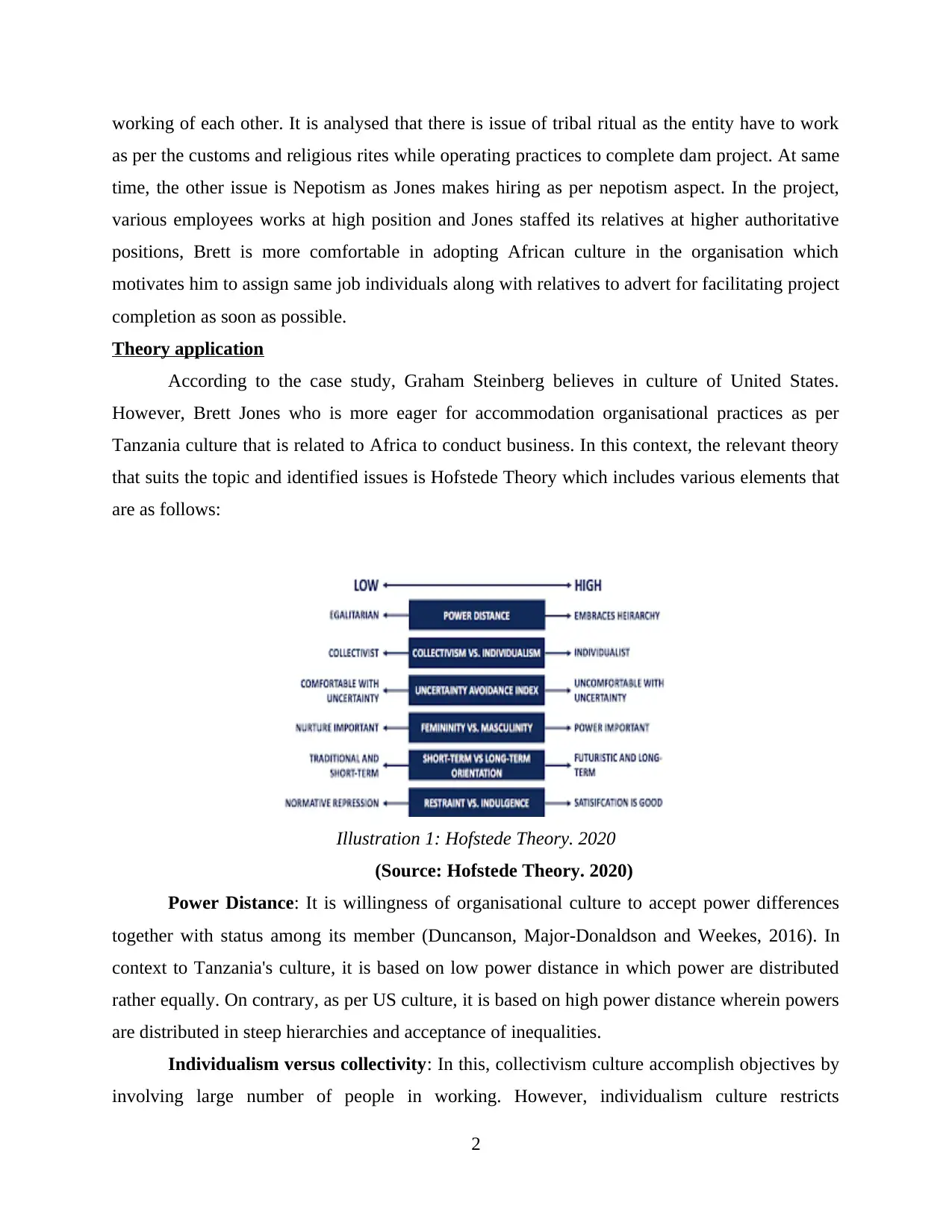
working of each other. It is analysed that there is issue of tribal ritual as the entity have to work
as per the customs and religious rites while operating practices to complete dam project. At same
time, the other issue is Nepotism as Jones makes hiring as per nepotism aspect. In the project,
various employees works at high position and Jones staffed its relatives at higher authoritative
positions, Brett is more comfortable in adopting African culture in the organisation which
motivates him to assign same job individuals along with relatives to advert for facilitating project
completion as soon as possible.
Theory application
According to the case study, Graham Steinberg believes in culture of United States.
However, Brett Jones who is more eager for accommodation organisational practices as per
Tanzania culture that is related to Africa to conduct business. In this context, the relevant theory
that suits the topic and identified issues is Hofstede Theory which includes various elements that
are as follows:
Illustration 1: Hofstede Theory. 2020
(Source: Hofstede Theory. 2020)
Power Distance: It is willingness of organisational culture to accept power differences
together with status among its member (Duncanson, Major-Donaldson and Weekes, 2016). In
context to Tanzania's culture, it is based on low power distance in which power are distributed
rather equally. On contrary, as per US culture, it is based on high power distance wherein powers
are distributed in steep hierarchies and acceptance of inequalities.
Individualism versus collectivity: In this, collectivism culture accomplish objectives by
involving large number of people in working. However, individualism culture restricts
2
as per the customs and religious rites while operating practices to complete dam project. At same
time, the other issue is Nepotism as Jones makes hiring as per nepotism aspect. In the project,
various employees works at high position and Jones staffed its relatives at higher authoritative
positions, Brett is more comfortable in adopting African culture in the organisation which
motivates him to assign same job individuals along with relatives to advert for facilitating project
completion as soon as possible.
Theory application
According to the case study, Graham Steinberg believes in culture of United States.
However, Brett Jones who is more eager for accommodation organisational practices as per
Tanzania culture that is related to Africa to conduct business. In this context, the relevant theory
that suits the topic and identified issues is Hofstede Theory which includes various elements that
are as follows:
Illustration 1: Hofstede Theory. 2020
(Source: Hofstede Theory. 2020)
Power Distance: It is willingness of organisational culture to accept power differences
together with status among its member (Duncanson, Major-Donaldson and Weekes, 2016). In
context to Tanzania's culture, it is based on low power distance in which power are distributed
rather equally. On contrary, as per US culture, it is based on high power distance wherein powers
are distributed in steep hierarchies and acceptance of inequalities.
Individualism versus collectivity: In this, collectivism culture accomplish objectives by
involving large number of people in working. However, individualism culture restricts
2
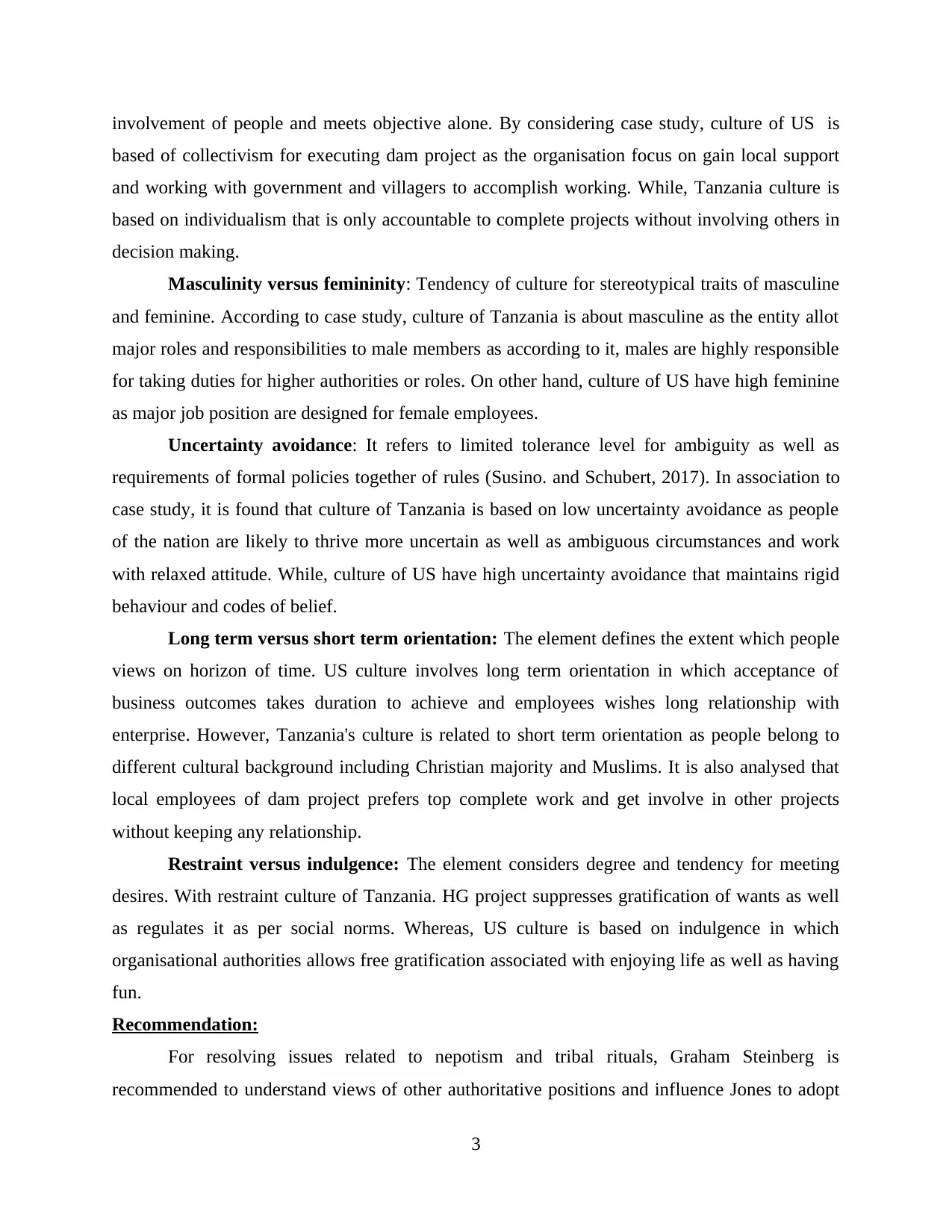
involvement of people and meets objective alone. By considering case study, culture of US is
based of collectivism for executing dam project as the organisation focus on gain local support
and working with government and villagers to accomplish working. While, Tanzania culture is
based on individualism that is only accountable to complete projects without involving others in
decision making.
Masculinity versus femininity: Tendency of culture for stereotypical traits of masculine
and feminine. According to case study, culture of Tanzania is about masculine as the entity allot
major roles and responsibilities to male members as according to it, males are highly responsible
for taking duties for higher authorities or roles. On other hand, culture of US have high feminine
as major job position are designed for female employees.
Uncertainty avoidance: It refers to limited tolerance level for ambiguity as well as
requirements of formal policies together of rules (Susino. and Schubert, 2017). In association to
case study, it is found that culture of Tanzania is based on low uncertainty avoidance as people
of the nation are likely to thrive more uncertain as well as ambiguous circumstances and work
with relaxed attitude. While, culture of US have high uncertainty avoidance that maintains rigid
behaviour and codes of belief.
Long term versus short term orientation: The element defines the extent which people
views on horizon of time. US culture involves long term orientation in which acceptance of
business outcomes takes duration to achieve and employees wishes long relationship with
enterprise. However, Tanzania's culture is related to short term orientation as people belong to
different cultural background including Christian majority and Muslims. It is also analysed that
local employees of dam project prefers top complete work and get involve in other projects
without keeping any relationship.
Restraint versus indulgence: The element considers degree and tendency for meeting
desires. With restraint culture of Tanzania. HG project suppresses gratification of wants as well
as regulates it as per social norms. Whereas, US culture is based on indulgence in which
organisational authorities allows free gratification associated with enjoying life as well as having
fun.
Recommendation:
For resolving issues related to nepotism and tribal rituals, Graham Steinberg is
recommended to understand views of other authoritative positions and influence Jones to adopt
3
based of collectivism for executing dam project as the organisation focus on gain local support
and working with government and villagers to accomplish working. While, Tanzania culture is
based on individualism that is only accountable to complete projects without involving others in
decision making.
Masculinity versus femininity: Tendency of culture for stereotypical traits of masculine
and feminine. According to case study, culture of Tanzania is about masculine as the entity allot
major roles and responsibilities to male members as according to it, males are highly responsible
for taking duties for higher authorities or roles. On other hand, culture of US have high feminine
as major job position are designed for female employees.
Uncertainty avoidance: It refers to limited tolerance level for ambiguity as well as
requirements of formal policies together of rules (Susino. and Schubert, 2017). In association to
case study, it is found that culture of Tanzania is based on low uncertainty avoidance as people
of the nation are likely to thrive more uncertain as well as ambiguous circumstances and work
with relaxed attitude. While, culture of US have high uncertainty avoidance that maintains rigid
behaviour and codes of belief.
Long term versus short term orientation: The element defines the extent which people
views on horizon of time. US culture involves long term orientation in which acceptance of
business outcomes takes duration to achieve and employees wishes long relationship with
enterprise. However, Tanzania's culture is related to short term orientation as people belong to
different cultural background including Christian majority and Muslims. It is also analysed that
local employees of dam project prefers top complete work and get involve in other projects
without keeping any relationship.
Restraint versus indulgence: The element considers degree and tendency for meeting
desires. With restraint culture of Tanzania. HG project suppresses gratification of wants as well
as regulates it as per social norms. Whereas, US culture is based on indulgence in which
organisational authorities allows free gratification associated with enjoying life as well as having
fun.
Recommendation:
For resolving issues related to nepotism and tribal rituals, Graham Steinberg is
recommended to understand views of other authoritative positions and influence Jones to adopt
3
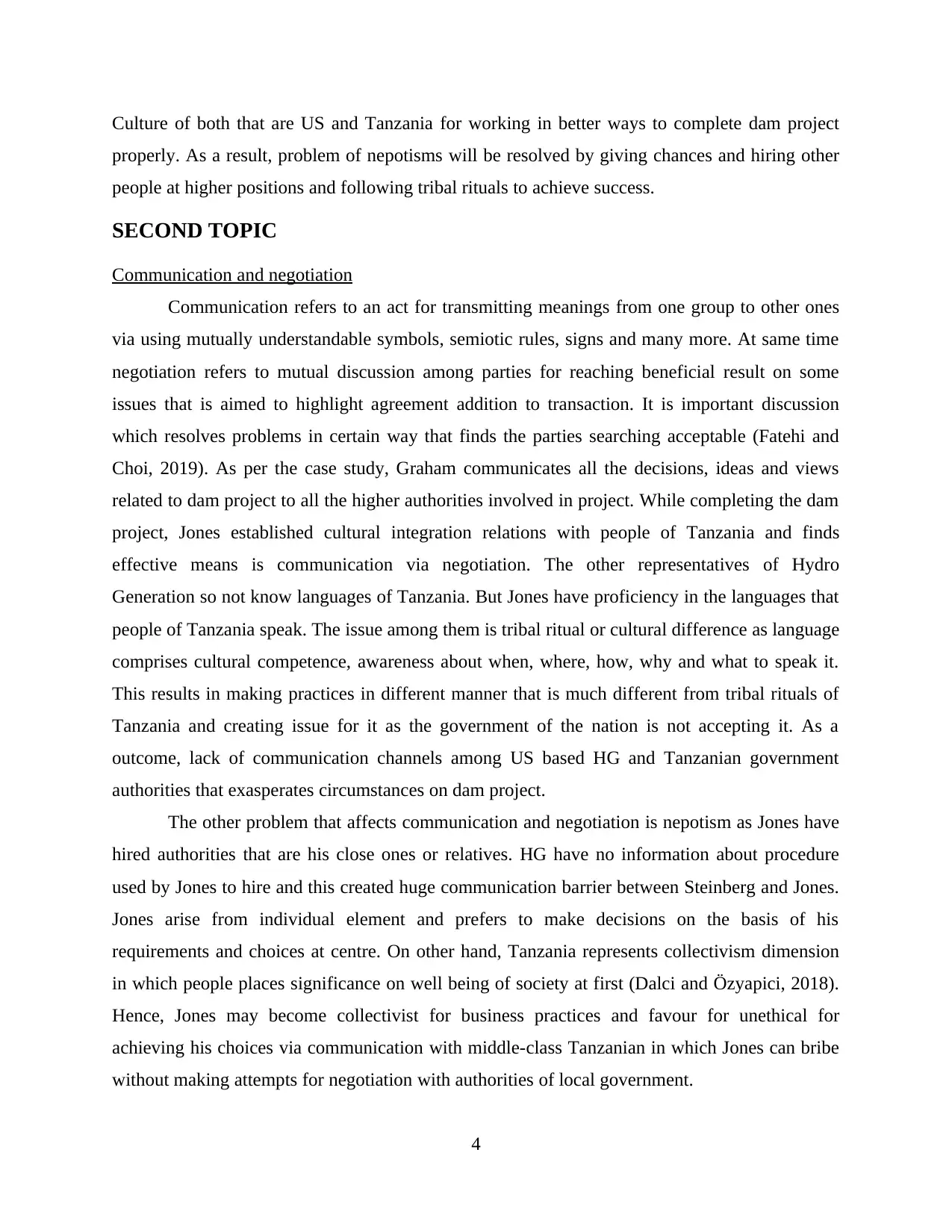
Culture of both that are US and Tanzania for working in better ways to complete dam project
properly. As a result, problem of nepotisms will be resolved by giving chances and hiring other
people at higher positions and following tribal rituals to achieve success.
SECOND TOPIC
Communication and negotiation
Communication refers to an act for transmitting meanings from one group to other ones
via using mutually understandable symbols, semiotic rules, signs and many more. At same time
negotiation refers to mutual discussion among parties for reaching beneficial result on some
issues that is aimed to highlight agreement addition to transaction. It is important discussion
which resolves problems in certain way that finds the parties searching acceptable (Fatehi and
Choi, 2019). As per the case study, Graham communicates all the decisions, ideas and views
related to dam project to all the higher authorities involved in project. While completing the dam
project, Jones established cultural integration relations with people of Tanzania and finds
effective means is communication via negotiation. The other representatives of Hydro
Generation so not know languages of Tanzania. But Jones have proficiency in the languages that
people of Tanzania speak. The issue among them is tribal ritual or cultural difference as language
comprises cultural competence, awareness about when, where, how, why and what to speak it.
This results in making practices in different manner that is much different from tribal rituals of
Tanzania and creating issue for it as the government of the nation is not accepting it. As a
outcome, lack of communication channels among US based HG and Tanzanian government
authorities that exasperates circumstances on dam project.
The other problem that affects communication and negotiation is nepotism as Jones have
hired authorities that are his close ones or relatives. HG have no information about procedure
used by Jones to hire and this created huge communication barrier between Steinberg and Jones.
Jones arise from individual element and prefers to make decisions on the basis of his
requirements and choices at centre. On other hand, Tanzania represents collectivism dimension
in which people places significance on well being of society at first (Dalci and Özyapici, 2018).
Hence, Jones may become collectivist for business practices and favour for unethical for
achieving his choices via communication with middle-class Tanzanian in which Jones can bribe
without making attempts for negotiation with authorities of local government.
4
properly. As a result, problem of nepotisms will be resolved by giving chances and hiring other
people at higher positions and following tribal rituals to achieve success.
SECOND TOPIC
Communication and negotiation
Communication refers to an act for transmitting meanings from one group to other ones
via using mutually understandable symbols, semiotic rules, signs and many more. At same time
negotiation refers to mutual discussion among parties for reaching beneficial result on some
issues that is aimed to highlight agreement addition to transaction. It is important discussion
which resolves problems in certain way that finds the parties searching acceptable (Fatehi and
Choi, 2019). As per the case study, Graham communicates all the decisions, ideas and views
related to dam project to all the higher authorities involved in project. While completing the dam
project, Jones established cultural integration relations with people of Tanzania and finds
effective means is communication via negotiation. The other representatives of Hydro
Generation so not know languages of Tanzania. But Jones have proficiency in the languages that
people of Tanzania speak. The issue among them is tribal ritual or cultural difference as language
comprises cultural competence, awareness about when, where, how, why and what to speak it.
This results in making practices in different manner that is much different from tribal rituals of
Tanzania and creating issue for it as the government of the nation is not accepting it. As a
outcome, lack of communication channels among US based HG and Tanzanian government
authorities that exasperates circumstances on dam project.
The other problem that affects communication and negotiation is nepotism as Jones have
hired authorities that are his close ones or relatives. HG have no information about procedure
used by Jones to hire and this created huge communication barrier between Steinberg and Jones.
Jones arise from individual element and prefers to make decisions on the basis of his
requirements and choices at centre. On other hand, Tanzania represents collectivism dimension
in which people places significance on well being of society at first (Dalci and Özyapici, 2018).
Hence, Jones may become collectivist for business practices and favour for unethical for
achieving his choices via communication with middle-class Tanzanian in which Jones can bribe
without making attempts for negotiation with authorities of local government.
4
Paraphrase This Document
Need a fresh take? Get an instant paraphrase of this document with our AI Paraphraser
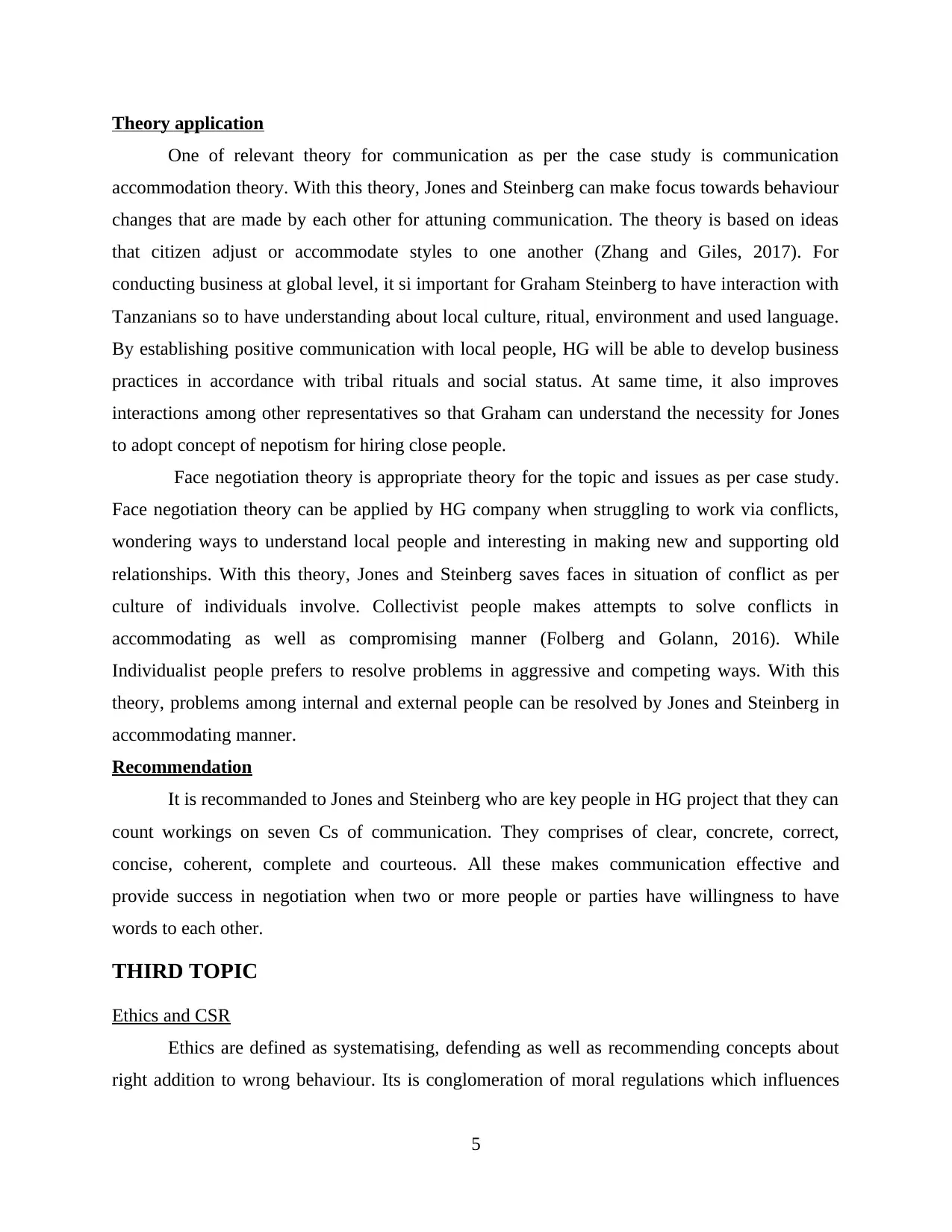
Theory application
One of relevant theory for communication as per the case study is communication
accommodation theory. With this theory, Jones and Steinberg can make focus towards behaviour
changes that are made by each other for attuning communication. The theory is based on ideas
that citizen adjust or accommodate styles to one another (Zhang and Giles, 2017). For
conducting business at global level, it si important for Graham Steinberg to have interaction with
Tanzanians so to have understanding about local culture, ritual, environment and used language.
By establishing positive communication with local people, HG will be able to develop business
practices in accordance with tribal rituals and social status. At same time, it also improves
interactions among other representatives so that Graham can understand the necessity for Jones
to adopt concept of nepotism for hiring close people.
Face negotiation theory is appropriate theory for the topic and issues as per case study.
Face negotiation theory can be applied by HG company when struggling to work via conflicts,
wondering ways to understand local people and interesting in making new and supporting old
relationships. With this theory, Jones and Steinberg saves faces in situation of conflict as per
culture of individuals involve. Collectivist people makes attempts to solve conflicts in
accommodating as well as compromising manner (Folberg and Golann, 2016). While
Individualist people prefers to resolve problems in aggressive and competing ways. With this
theory, problems among internal and external people can be resolved by Jones and Steinberg in
accommodating manner.
Recommendation
It is recommanded to Jones and Steinberg who are key people in HG project that they can
count workings on seven Cs of communication. They comprises of clear, concrete, correct,
concise, coherent, complete and courteous. All these makes communication effective and
provide success in negotiation when two or more people or parties have willingness to have
words to each other.
THIRD TOPIC
Ethics and CSR
Ethics are defined as systematising, defending as well as recommending concepts about
right addition to wrong behaviour. Its is conglomeration of moral regulations which influences
5
One of relevant theory for communication as per the case study is communication
accommodation theory. With this theory, Jones and Steinberg can make focus towards behaviour
changes that are made by each other for attuning communication. The theory is based on ideas
that citizen adjust or accommodate styles to one another (Zhang and Giles, 2017). For
conducting business at global level, it si important for Graham Steinberg to have interaction with
Tanzanians so to have understanding about local culture, ritual, environment and used language.
By establishing positive communication with local people, HG will be able to develop business
practices in accordance with tribal rituals and social status. At same time, it also improves
interactions among other representatives so that Graham can understand the necessity for Jones
to adopt concept of nepotism for hiring close people.
Face negotiation theory is appropriate theory for the topic and issues as per case study.
Face negotiation theory can be applied by HG company when struggling to work via conflicts,
wondering ways to understand local people and interesting in making new and supporting old
relationships. With this theory, Jones and Steinberg saves faces in situation of conflict as per
culture of individuals involve. Collectivist people makes attempts to solve conflicts in
accommodating as well as compromising manner (Folberg and Golann, 2016). While
Individualist people prefers to resolve problems in aggressive and competing ways. With this
theory, problems among internal and external people can be resolved by Jones and Steinberg in
accommodating manner.
Recommendation
It is recommanded to Jones and Steinberg who are key people in HG project that they can
count workings on seven Cs of communication. They comprises of clear, concrete, correct,
concise, coherent, complete and courteous. All these makes communication effective and
provide success in negotiation when two or more people or parties have willingness to have
words to each other.
THIRD TOPIC
Ethics and CSR
Ethics are defined as systematising, defending as well as recommending concepts about
right addition to wrong behaviour. Its is conglomeration of moral regulations which influences
5
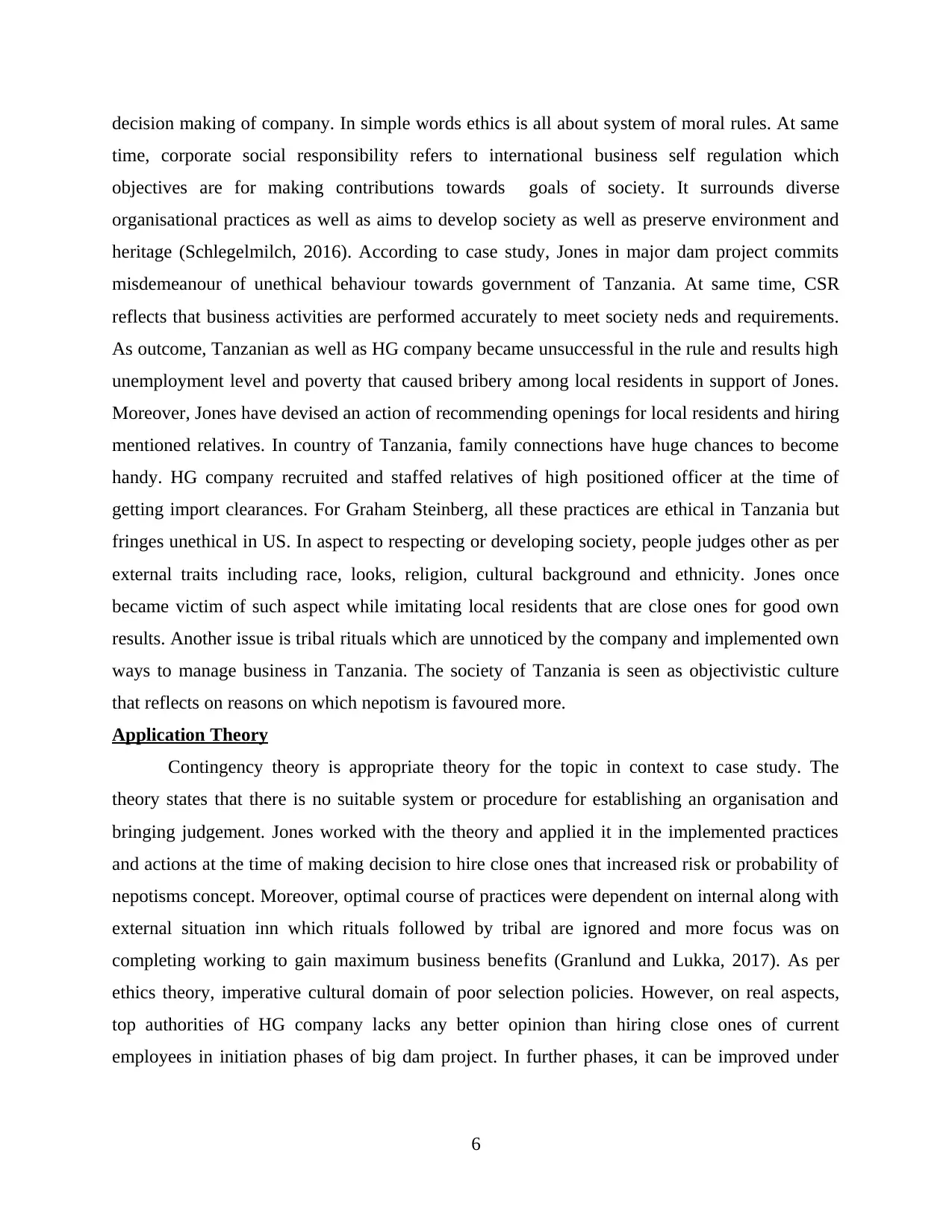
decision making of company. In simple words ethics is all about system of moral rules. At same
time, corporate social responsibility refers to international business self regulation which
objectives are for making contributions towards goals of society. It surrounds diverse
organisational practices as well as aims to develop society as well as preserve environment and
heritage (Schlegelmilch, 2016). According to case study, Jones in major dam project commits
misdemeanour of unethical behaviour towards government of Tanzania. At same time, CSR
reflects that business activities are performed accurately to meet society neds and requirements.
As outcome, Tanzanian as well as HG company became unsuccessful in the rule and results high
unemployment level and poverty that caused bribery among local residents in support of Jones.
Moreover, Jones have devised an action of recommending openings for local residents and hiring
mentioned relatives. In country of Tanzania, family connections have huge chances to become
handy. HG company recruited and staffed relatives of high positioned officer at the time of
getting import clearances. For Graham Steinberg, all these practices are ethical in Tanzania but
fringes unethical in US. In aspect to respecting or developing society, people judges other as per
external traits including race, looks, religion, cultural background and ethnicity. Jones once
became victim of such aspect while imitating local residents that are close ones for good own
results. Another issue is tribal rituals which are unnoticed by the company and implemented own
ways to manage business in Tanzania. The society of Tanzania is seen as objectivistic culture
that reflects on reasons on which nepotism is favoured more.
Application Theory
Contingency theory is appropriate theory for the topic in context to case study. The
theory states that there is no suitable system or procedure for establishing an organisation and
bringing judgement. Jones worked with the theory and applied it in the implemented practices
and actions at the time of making decision to hire close ones that increased risk or probability of
nepotisms concept. Moreover, optimal course of practices were dependent on internal along with
external situation inn which rituals followed by tribal are ignored and more focus was on
completing working to gain maximum business benefits (Granlund and Lukka, 2017). As per
ethics theory, imperative cultural domain of poor selection policies. However, on real aspects,
top authorities of HG company lacks any better opinion than hiring close ones of current
employees in initiation phases of big dam project. In further phases, it can be improved under
6
time, corporate social responsibility refers to international business self regulation which
objectives are for making contributions towards goals of society. It surrounds diverse
organisational practices as well as aims to develop society as well as preserve environment and
heritage (Schlegelmilch, 2016). According to case study, Jones in major dam project commits
misdemeanour of unethical behaviour towards government of Tanzania. At same time, CSR
reflects that business activities are performed accurately to meet society neds and requirements.
As outcome, Tanzanian as well as HG company became unsuccessful in the rule and results high
unemployment level and poverty that caused bribery among local residents in support of Jones.
Moreover, Jones have devised an action of recommending openings for local residents and hiring
mentioned relatives. In country of Tanzania, family connections have huge chances to become
handy. HG company recruited and staffed relatives of high positioned officer at the time of
getting import clearances. For Graham Steinberg, all these practices are ethical in Tanzania but
fringes unethical in US. In aspect to respecting or developing society, people judges other as per
external traits including race, looks, religion, cultural background and ethnicity. Jones once
became victim of such aspect while imitating local residents that are close ones for good own
results. Another issue is tribal rituals which are unnoticed by the company and implemented own
ways to manage business in Tanzania. The society of Tanzania is seen as objectivistic culture
that reflects on reasons on which nepotism is favoured more.
Application Theory
Contingency theory is appropriate theory for the topic in context to case study. The
theory states that there is no suitable system or procedure for establishing an organisation and
bringing judgement. Jones worked with the theory and applied it in the implemented practices
and actions at the time of making decision to hire close ones that increased risk or probability of
nepotisms concept. Moreover, optimal course of practices were dependent on internal along with
external situation inn which rituals followed by tribal are ignored and more focus was on
completing working to gain maximum business benefits (Granlund and Lukka, 2017). As per
ethics theory, imperative cultural domain of poor selection policies. However, on real aspects,
top authorities of HG company lacks any better opinion than hiring close ones of current
employees in initiation phases of big dam project. In further phases, it can be improved under
6
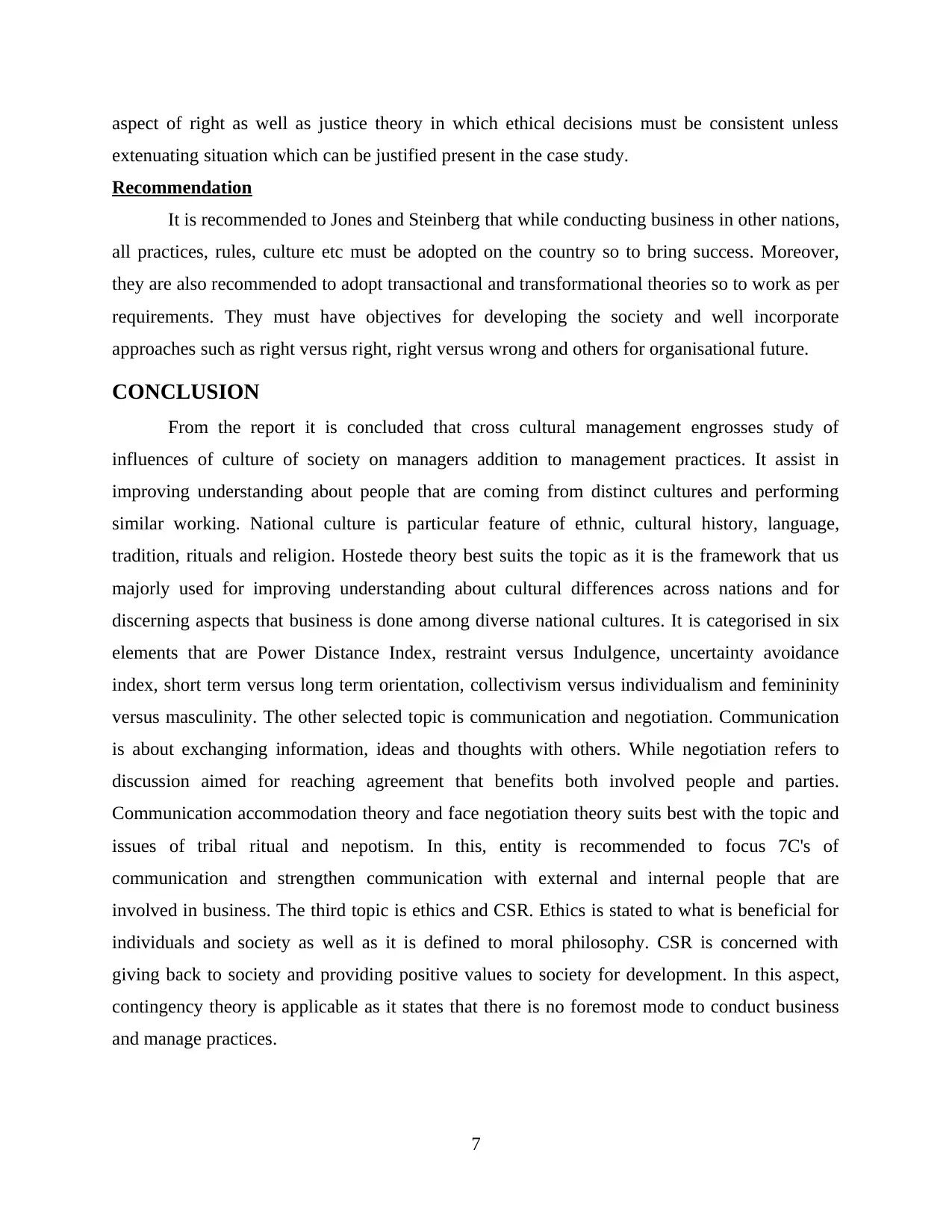
aspect of right as well as justice theory in which ethical decisions must be consistent unless
extenuating situation which can be justified present in the case study.
Recommendation
It is recommended to Jones and Steinberg that while conducting business in other nations,
all practices, rules, culture etc must be adopted on the country so to bring success. Moreover,
they are also recommended to adopt transactional and transformational theories so to work as per
requirements. They must have objectives for developing the society and well incorporate
approaches such as right versus right, right versus wrong and others for organisational future.
CONCLUSION
From the report it is concluded that cross cultural management engrosses study of
influences of culture of society on managers addition to management practices. It assist in
improving understanding about people that are coming from distinct cultures and performing
similar working. National culture is particular feature of ethnic, cultural history, language,
tradition, rituals and religion. Hostede theory best suits the topic as it is the framework that us
majorly used for improving understanding about cultural differences across nations and for
discerning aspects that business is done among diverse national cultures. It is categorised in six
elements that are Power Distance Index, restraint versus Indulgence, uncertainty avoidance
index, short term versus long term orientation, collectivism versus individualism and femininity
versus masculinity. The other selected topic is communication and negotiation. Communication
is about exchanging information, ideas and thoughts with others. While negotiation refers to
discussion aimed for reaching agreement that benefits both involved people and parties.
Communication accommodation theory and face negotiation theory suits best with the topic and
issues of tribal ritual and nepotism. In this, entity is recommended to focus 7C's of
communication and strengthen communication with external and internal people that are
involved in business. The third topic is ethics and CSR. Ethics is stated to what is beneficial for
individuals and society as well as it is defined to moral philosophy. CSR is concerned with
giving back to society and providing positive values to society for development. In this aspect,
contingency theory is applicable as it states that there is no foremost mode to conduct business
and manage practices.
7
extenuating situation which can be justified present in the case study.
Recommendation
It is recommended to Jones and Steinberg that while conducting business in other nations,
all practices, rules, culture etc must be adopted on the country so to bring success. Moreover,
they are also recommended to adopt transactional and transformational theories so to work as per
requirements. They must have objectives for developing the society and well incorporate
approaches such as right versus right, right versus wrong and others for organisational future.
CONCLUSION
From the report it is concluded that cross cultural management engrosses study of
influences of culture of society on managers addition to management practices. It assist in
improving understanding about people that are coming from distinct cultures and performing
similar working. National culture is particular feature of ethnic, cultural history, language,
tradition, rituals and religion. Hostede theory best suits the topic as it is the framework that us
majorly used for improving understanding about cultural differences across nations and for
discerning aspects that business is done among diverse national cultures. It is categorised in six
elements that are Power Distance Index, restraint versus Indulgence, uncertainty avoidance
index, short term versus long term orientation, collectivism versus individualism and femininity
versus masculinity. The other selected topic is communication and negotiation. Communication
is about exchanging information, ideas and thoughts with others. While negotiation refers to
discussion aimed for reaching agreement that benefits both involved people and parties.
Communication accommodation theory and face negotiation theory suits best with the topic and
issues of tribal ritual and nepotism. In this, entity is recommended to focus 7C's of
communication and strengthen communication with external and internal people that are
involved in business. The third topic is ethics and CSR. Ethics is stated to what is beneficial for
individuals and society as well as it is defined to moral philosophy. CSR is concerned with
giving back to society and providing positive values to society for development. In this aspect,
contingency theory is applicable as it states that there is no foremost mode to conduct business
and manage practices.
7
Secure Best Marks with AI Grader
Need help grading? Try our AI Grader for instant feedback on your assignments.
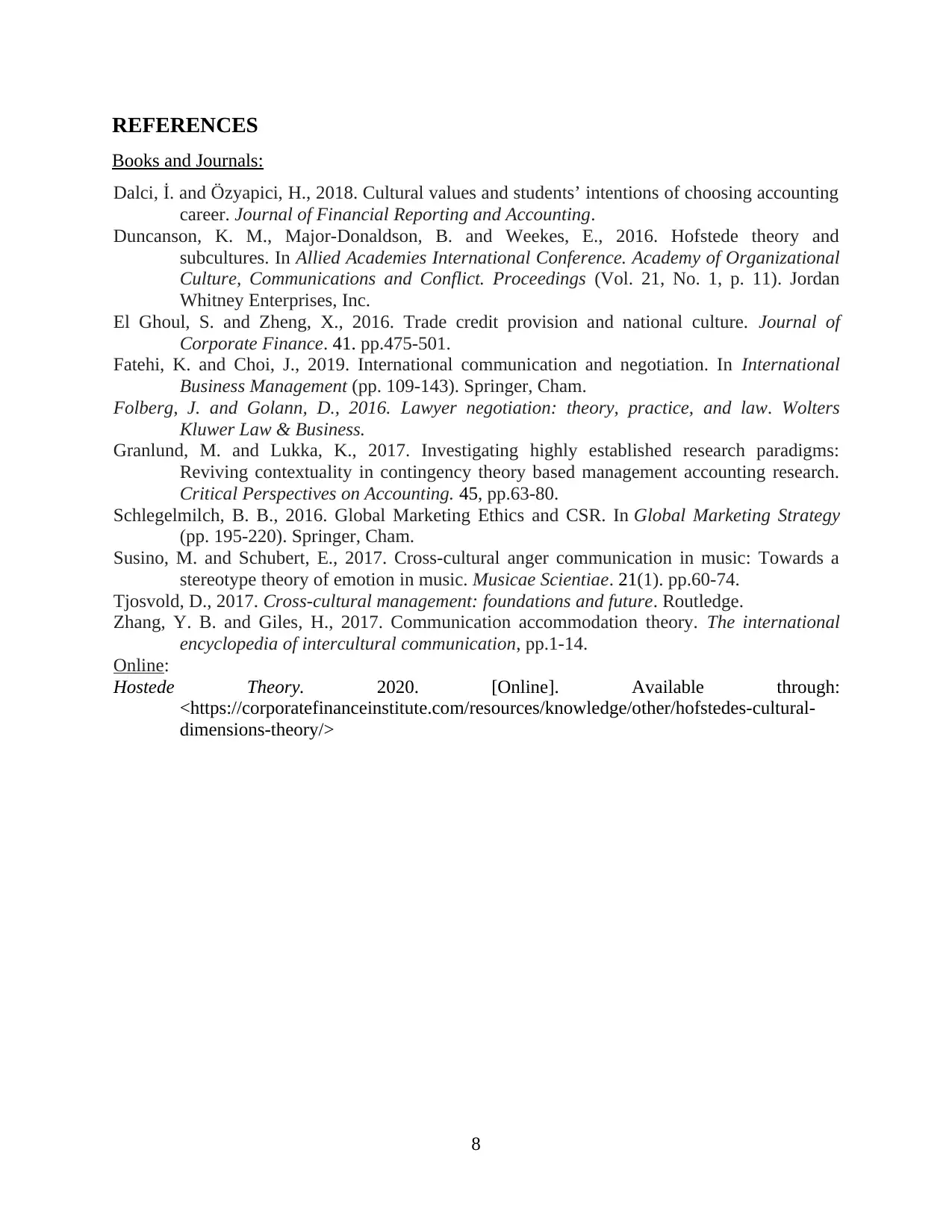
REFERENCES
Books and Journals:
Dalci, İ. and Özyapici, H., 2018. Cultural values and students’ intentions of choosing accounting
career. Journal of Financial Reporting and Accounting.
Duncanson, K. M., Major-Donaldson, B. and Weekes, E., 2016. Hofstede theory and
subcultures. In Allied Academies International Conference. Academy of Organizational
Culture, Communications and Conflict. Proceedings (Vol. 21, No. 1, p. 11). Jordan
Whitney Enterprises, Inc.
El Ghoul, S. and Zheng, X., 2016. Trade credit provision and national culture. Journal of
Corporate Finance. 41. pp.475-501.
Fatehi, K. and Choi, J., 2019. International communication and negotiation. In International
Business Management (pp. 109-143). Springer, Cham.
Folberg, J. and Golann, D., 2016. Lawyer negotiation: theory, practice, and law. Wolters
Kluwer Law & Business.
Granlund, M. and Lukka, K., 2017. Investigating highly established research paradigms:
Reviving contextuality in contingency theory based management accounting research.
Critical Perspectives on Accounting. 45, pp.63-80.
Schlegelmilch, B. B., 2016. Global Marketing Ethics and CSR. In Global Marketing Strategy
(pp. 195-220). Springer, Cham.
Susino, M. and Schubert, E., 2017. Cross-cultural anger communication in music: Towards a
stereotype theory of emotion in music. Musicae Scientiae. 21(1). pp.60-74.
Tjosvold, D., 2017. Cross-cultural management: foundations and future. Routledge.
Zhang, Y. B. and Giles, H., 2017. Communication accommodation theory. The international
encyclopedia of intercultural communication, pp.1-14.
Online:
Hostede Theory. 2020. [Online]. Available through:
<https://corporatefinanceinstitute.com/resources/knowledge/other/hofstedes-cultural-
dimensions-theory/>
8
Books and Journals:
Dalci, İ. and Özyapici, H., 2018. Cultural values and students’ intentions of choosing accounting
career. Journal of Financial Reporting and Accounting.
Duncanson, K. M., Major-Donaldson, B. and Weekes, E., 2016. Hofstede theory and
subcultures. In Allied Academies International Conference. Academy of Organizational
Culture, Communications and Conflict. Proceedings (Vol. 21, No. 1, p. 11). Jordan
Whitney Enterprises, Inc.
El Ghoul, S. and Zheng, X., 2016. Trade credit provision and national culture. Journal of
Corporate Finance. 41. pp.475-501.
Fatehi, K. and Choi, J., 2019. International communication and negotiation. In International
Business Management (pp. 109-143). Springer, Cham.
Folberg, J. and Golann, D., 2016. Lawyer negotiation: theory, practice, and law. Wolters
Kluwer Law & Business.
Granlund, M. and Lukka, K., 2017. Investigating highly established research paradigms:
Reviving contextuality in contingency theory based management accounting research.
Critical Perspectives on Accounting. 45, pp.63-80.
Schlegelmilch, B. B., 2016. Global Marketing Ethics and CSR. In Global Marketing Strategy
(pp. 195-220). Springer, Cham.
Susino, M. and Schubert, E., 2017. Cross-cultural anger communication in music: Towards a
stereotype theory of emotion in music. Musicae Scientiae. 21(1). pp.60-74.
Tjosvold, D., 2017. Cross-cultural management: foundations and future. Routledge.
Zhang, Y. B. and Giles, H., 2017. Communication accommodation theory. The international
encyclopedia of intercultural communication, pp.1-14.
Online:
Hostede Theory. 2020. [Online]. Available through:
<https://corporatefinanceinstitute.com/resources/knowledge/other/hofstedes-cultural-
dimensions-theory/>
8
1 out of 11
Your All-in-One AI-Powered Toolkit for Academic Success.
+13062052269
info@desklib.com
Available 24*7 on WhatsApp / Email
![[object Object]](/_next/static/media/star-bottom.7253800d.svg)
Unlock your academic potential
© 2024 | Zucol Services PVT LTD | All rights reserved.





